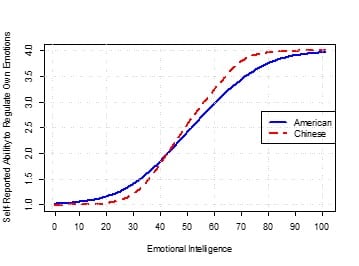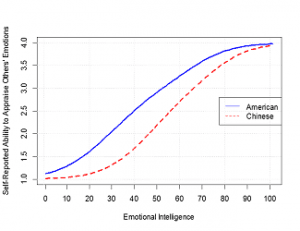Difference of Emotional Intelligence Across Cultures
Doctoral student Matthew L. Lapalme and Assistant Professors Wei Wang, Ph.D., and Dana Joseph, Ph.D., of the department of psychology, collaborated on a recently published paper, “Measurement equivalence of the Wong and Law Emotional Intelligence Scale across cultures: An item response theory approach.”, regarding cross cultural differences in emotional intelligence between Chinese and U.S. college students.
Dr. Wang’s lab, the Computational Psychology Laboratory, studies applied psychometrics, social networks, and big data. By collaborating with Dr. Joseph, Dr. Saklofske (University of Western Ontario), and Dr. Yan (Beijing Normal University) their team recently found that appraising other’s emotions is the most challenging component in emotional intelligence across cultures.
 This interesting finding was discovered by using the state-of-the-art ideal-point item response theory (IRT) model to examine the most widely used emotional intelligence measure that was administered to over 1000 college students in Beijing and United States.
This interesting finding was discovered by using the state-of-the-art ideal-point item response theory (IRT) model to examine the most widely used emotional intelligence measure that was administered to over 1000 college students in Beijing and United States.
This emotional intelligence measure consists of four dimensions: self-emotional appraisal, other-emotional appraisal, use of emotion, and regulation of emotions. Dr. Wang’s research team found that there was negligible difference in self-emotional appraisal and regulation of emotions between American and Chinese cultures.
However, the difference was fairly large for the other-emotional appraisal dimension, followed by the use of emotion. Dr. Wang explained that it is likely due to the cultural difference that Americans are typical emotionally expressive while Asians tend to be reserved, and he believes this finding has important implications for international business, negotiation, politics, etc.
Dr. Wang explained that it is likely due to the cultural difference that Americans are typical emotionally expressive while Asians tend to be reserved, and he believes this finding has important implications for international business, negotiation, politics, etc.
Dr. Wang is leading a research team to further examine the personality differences cross cultures and groups (e.g., genders, political views, high vs. low intelligence, etc.) by collecting massive Facebook data, with a goal of developing psychological tests that are invariant cross cultures for the purpose of international talent recruitment, such as multinational company human resource recruitment management and international student admission.
Matthew Lapalme is currently a third year Ph.D. student and he conducted this research under Dr. Wang’s supervision in the Computational Psychology Laboratory. Matthew is interested in applied psychometrics and emotional intelligence.
Dr. Wang is an assistant professor of Industrial/Organizational Psychology at UCF. He completed his B.S. in psychology at Beijing Normal University and one year post-baccalaureate at the University of Florida before finishing his Ph.D. in psychology at the University of Illinois at Urbana-Champaign. He has great passion and energy for psychological research through the computational and big data approach.

